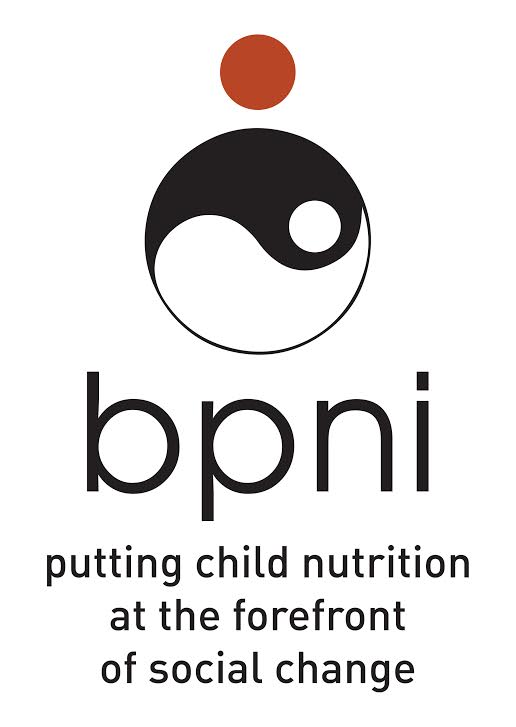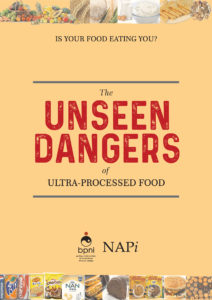
Ultra-Processed Foods (UPFs)
Webinar on What you need to know about Ultra-Processed Foods (UPFs)?
The science, policy responses and politics in global context: 20 July, 2020
Organised by NAPi and BPNI in collaboration with Deakin University and NUPENS / UPS Supported by UNICEF
Background
The Breastfeeding Promotion Network of India (BPNI) and Nutrition Advocacy in Public Interest (NAPi) organise this Webinar believing that guidance for consumption of UPFs becomes even more important as we continue to face the Covid-19 pandemic.
The World Health Organisation recommends “healthy diet” for all infants, young children and adults. The WHO also advises about salt, sugar and fats one should consume. Concerns have been expressed globally about the negative impact on human health of the replacement of real foods by products so industrially processed that they are hardly recognisable from their raw ingredients. Industrialised Nations have witnessed substantial replacement and developing countries are fast catching up. Increased intake of UPFs often high in fat, sugar, salt, chemical additives, low in fibre and food-based nutrients, is a matter of great concern. Recent reviews have thrown light on health outcomes as a result of exposure to UPFs.
Professor Carlos Monteiro from University of Sao Paulo, Brazil, and his team while studying dietary patterns in Brazil, found that obesity in adults went up from 7.5% in 2002 to 17.5% in 2013. This finding was surprising because of the fact that people were buying less sugar and oil. This team observed that consumption of highly processed or ultra-processed foods (UPFs), ready to eat, sugary and packaged food products had gone up during this time. They felt the need to classify foods according to the extent and purpose of food processing rather than in terms of nutrients. This led to “NOVA Food Classification”. Their team also developed a guide to identify to which group the food belongs.
Objectives: The Webinar will provide updated information on UPFs, scientific evidence of consuming UPFs on health outcomes, global and regional dietary patterns, NOVA classification of foods with examples and to make policy recommendations and how marketing tactics influence consumption of UPFs.
SPEAKERS

Prof. Harshpal Singh Sachdev, MD, FIAP, FAMS, FRCPCH
Senior Consultant, Sitaram Bhartia Institute of Science and Research
Harshpal Singh Sachdev, who is a Senior Consultant in Pediatrics and Clinical Epidemiology at Sitaram Bhartia Institute of Science and Research, New Delhi; Honorary Senior Research Fellow, UCL Institute for Global Health, University College London; Adjunct Professor, St. John’s Research Institute, Bangalore; and a practicing paediatrician. Professor Sachdev is credited with 313 indexed publications, editing 16 books and contributing to 39 reports. He has published several systematic reviews including Cochrane reviews on nutrition and child health and has been an editor for the Cochrane Developmental, Psychosocial and Learning Problems Group since 2008. Email Id- hpssachdev@gmail.com

Dr. Maria Laura Louzada,PhD
Assistant Professor, Dept of Nutrition, USP, Brazil
Dr. Maria Laura Louzada is a PhD in Public Health Nutrition and is currently an assistant professor at the Department of Nutrition at the School of Public Health at the University of São Paulo and a researcher at the Center for Epidemiological Research in Nutrition and Health (NUPENS/UPS). Her research interests broadly focus on the association between food consumption, particularly of ultra-processed foods, and chronic disease risk in nationally representative surveys. She is also a co-investigator of Nutrinet Brasil study, a web-based cohort study that will investigate risk factors for chronic diseases in 200 thousand Brazilian adults during 10 years. Email Id-maria.laura.louzada@usp.br

Dr. Arun Gupta (MD Ped)
Convener-NAPi,Central Coordinator BPNI
Dr. Arun Gupta is a pediatrician, a Fellow of Indian Academy of Pediatrics who chose to give up his lucrative private practice and founded the ‘Breastfeeding Promotion Network of India’ (BPNI) in 1991. He focuses on policy analysis regarding support to breastfeeding women, child nutrition and conflicts of interest. He writes nationally and internationally. He is the creator of IBFAN’s World Breastfeeding Trends Initiative (WBTi). He is the convener of the “Alliance Against Conflict of Interest” (AACI) and “Nutrition Advocacy in Public Interest” (NAPI) in India for policy level inputs. Email Id-arun.ibfan@gmail.com

Dr. JP Dadhich MD (Paediatrics); FNNF
Member NAPi, Technical Director, BPNI
Dr. JP Dadhich is Director Technical, BPNI, India. He is MD Pediatrics, a fellow at National Neonatology Forum, He has been an integral part of BPNI since more than one and a half decade. He is a co-chair of the global council of International Baby Food Action Network. He has several publications in peer reviewed journals and has contributed to several guidelines and chapters on breastfeeding and infant and young child feeding. Email Id-jpdadhich@bpni.org

Dr. Phillip Baker
Research Fellow, Deakin University, Australia
Dr. Baker is a Research Fellow at Deakin University, and member of the Institute for Physical Activity and Nutrition. He holds a PhD from the National Centre for Epidemiology and Population Health, Australian National University. His research focuses on understanding the links between food systems change, the nutrition transition, public health and sustainability, and on informing policy and programming actions to prevent undernutrition, obesity, and non-communicable diseases in Australia and internationally. Much of his recent work has focused on the political economy of food systems and nutrition, ultra-processed foods, infant and child nutrition, and on global nutrition politics and governance. Dr Baker is a member of the Independent Expert Group of the Global Nutrition Report. He was recently a fellow of the Lancet Commission on Obesity. Email Id-phil.baker@deakin.edu.au
Download PowerPoint Presentation
Dietary patterns in Brazil and globally, evidence of increased consumption of UPFs on health outcomes and it’s mechanisms-Dr Maria Laura Louzada, Assistant Professor, Dept of Nutrition, USP
Identifying foods according to NOVA Classification and how to make a food choice to reduce consumption of ultra-processed foods?-Dr Arun Gupta, Convener-NAPi,Central Coordinator BPNI
Politics, marketing, and conflicts of interest in science of ultra-processed foods-Dr. JP Dadhich, Member NAPi, Technical Director, BPNI
Policy responses to ultra-processed foods in global context -Dr. Phillip Baker, Research Fellow, Deakin University
Webinar's Video-recording
Language: English
Statement and Call to Action on Consumption of Ultra- Processed Foods
Translations Available:
English , Hindi, Gujarati, Punjabi, Assamese, Bangla
Kannada, Marathi, Telugu, Manipuri (Meetei mayek)
Manipuri (Bengali Script), Odia, Malayalam, Tamil, Urdu
Media
- Patrika news on our letter to Virat Kohli, September 26, 2020
- Should India adopt NOVA classification of food? - The Sunday Guardian Live, September 26, 2020
- The Conversation-The rise of ultra-processed foods and why they’re really bad for our health, September 14, 2020
- NDTV-National Nutrition Week: What Is NOVA Classification Of Food And How It Can Help In Making An Informed Choice?: Aastha Ahuja, September 4, 2020
- The News 21- Should India Adopt NOVA Classification of Food? , September 1, 2020
- Online library wiley- OBESITY reviews: Individuals with obesity and COVID‐19: A global perspective on the epidemiology and biological relationships,Barry M. Popkin July 2020
- Sunday Guardian Live-Get to know what is on your plate: Dr. Arun Gupta, June 20, 2020
- Mumbai Mirror-The Dangers of Ultra-Processed Food: Altaf Patel, May 26, 2020
Scientific Evidences
- 2021-Associations between ultraprocessed food consumption and total water intake in the US population - ScienceDirect
- 2021-Consumption of Ultra-Processed Food and Its Association with Sociodemographic Characteristics and Diet Quality in a Representative Sample of French Adults
- 2021-Association of ultra-processed food consumption with cardiovascular mortality in the US population: long-term results from a large prospective multicenter study
- 2020-Ultra-processed food consumption is associated with increased risk of all-cause and cardiovascular mortality in the Moli-sani Study | The American Journal of Clinical Nutrition | Oxford Academic
- 2020-Ultra-processed foods and the corporate capture of nutrition—an essay by Gyorgy Scrinis | The BMJ
- 2020-Ultra-processed food consumption and obesity in the Australian adult population
- 2020-Ultraprocessed food and chronic noncommunicable diseases: A systematic review and meta‐analysis of 43 observational studies
- 2020-Ultraprocessed Food: Addictive, Toxic, and Ready for Regulation
- 2020- Phil Baker et al First Food systems
- 2020-UPF and Health risks
- 2020-UPF in Children Eu
- 2020-OHCHR _ Statement by the UN Special Rapporteur on the right to health on the adoption of front-of-package warning labelling to tackle NCDs
- 2020-Nutri Score BMJ
- 2020-UPFs obesity Metaanalysis IJO
- 2020- UPFs and Health Outcomes
- 2020-JAMA Network: Nutrient Warnings on Unhealthy Foods,
- 2020-Nutrients,Lind seywarning review FOPL
- UN Special Rapporteur Statement on the right to health on the adoption of front-of-package warning labelling to tackle NCDs
- 2020-Mialon, M., Crosbie, E. & Sacks, G. Mapping of food industry strategies to influence public health policy,research and practice in South Africa. Int J Public Health
- 2019-FAO:-Ultra-processed foods’ impacts on health
- 2019-BMC Public Health:- Reyes, M., Garmendia, M.L., Olivares, S. et al. Development of the Chilean front-of-package food warning label
- 2019 Hilton 2019 emss-81810
- 2018-UPF and Cancer risk
- 2017-Baker__Accelerating worldwide adoption of SSBs
- 2016-Baker Friel_2016_Food systems transformations ultra processed foods nutrition transiition Asia
- 2016-WN NOVA
- 2014 -Baker_Friel_Processed foods and the nutrition transition - evidence from Asia
- 2020-WHO: A Framework for Implementing the Set of Recommendations on the marketing of foods and non-alcoholic beverages to children
- 2012 Moubarac, (Canada)
- 2012-Infant formula is UPF WN George Kent
- 2011 Monteiro (ultra processados, evidence from Brazil)

